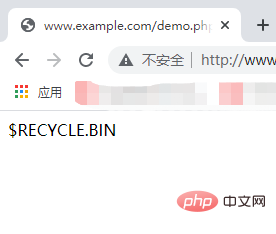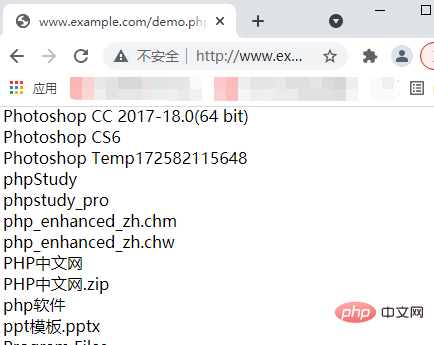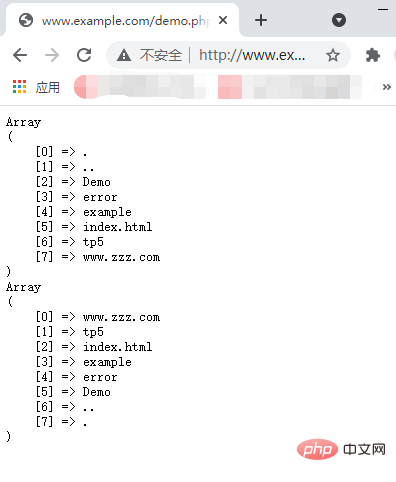 Backend Development
Backend Development
 PHP Tutorial
PHP Tutorial
 How to get the file name in the directory in PHP (summary sharing)
How to get the file name in the directory in PHP (summary sharing)
How to get the file name in the directory in PHP (summary sharing)
In the previous article "Knowledge Summary of Closing and Opening Directories in PHP File Processing", the relevant knowledge of how to open and close directories in PHP was introduced in detail. Let's continue to look at this article. Let’s take a look at how to obtain relevant knowledge about files in a directory in PHP. Among them is the knowledge about opening and closing directories in our previous article. I hope it will be helpful to everyone!

We have learned how to open and close a directory in PHP. Before closing the directory, the directory will be operated. One of the commonly used operations is to obtain the contents of the directory. Files and folders.
In other words, if you want to know how to get the files in the directory, you must first open and close the directory, so opendir() function and closedir()If you don’t understand the function yet, you can click on the link above to learn. Let's take a look at how to obtain the files in the directory in PHP.
In PHP, we can complete the operation of obtaining the file name in the directory through the readdir() function and the scandir() function.
<strong><span style="font-size: 20px;">readdir()</span></strong>Function gets the next file name in the file
readdir() The function is a simple operation. It is simple because when the function is executed successfully, it can return to open the directory through the opendir() function A file or directory name in; if the function does not execute successfully, the returned result is flase.
The basic syntax format of the readdir() function is as follows:
readdir([resource $dir_handle])
It should be noted that: $dir_handle is an optional parameter. When filled in, it means is the directory parameter opened through the opendir() function.
Next, let’s take a look at the use of the readdir() function through an example. The example is as follows:
<?php
$dir = 'D:';
if(is_dir($dir)){
$info = opendir($dir);
$file = readdir($info);
echo $file.'<br>';
closedir($info);
}
?>Output result:

This writing method in the above example is generally not used. Generally, if you want to obtain the files in all directories through the readdir() function, you need to obtain them through a while loop. The example is as follows:
<?php
$dir = 'D:';
if(is_dir($dir)){
$info = opendir($dir);
while (($file = readdir($info)) !== false) {
echo $file.'<br>';
}
closedir($info);
}
?>Output result:

In this way, we complete the acquisition of the file name in the target directory through the readdir() function and the while loop. This is the application of the readdir() function. Next, let's look at another method, which is the scandir() function.
<strong><span style="max-width:90%">scandir()</span></strong>Function, returns the directory file name in array form
We learned above that the readdir() function can obtain the file name in the target directory, and with the while loop, the file or directory name in the directory can be obtained simply and directly. The scandir() function to be discussed next is somewhat different from the readdir() function.
readdir()The function can only return one file name at a time, but thescandir()function can return all files in the target directory after successful execution. The file name and directory name;readdirThe result returned is directly the name of the file,scandirThe result returned is also the name of the file but it is The result returned in the form of an array;readdirIf the function is not executed successfully, the returned result is false,scandirWhen the function is not executed successfully The returned value is also flase but there will also be an error message.
Let’s take a look at the basic syntax of the scandir() function. The example is as follows:
scandir(string $directory[, int $sorting_order[, resource $context]])
What needs to be noted is: $directory indicates the directory to be read; when the parameter of $sorting_order is set to SCANDIR_SORT_DESCENDING or 1, the returned result is the file name, and their The sorting order is in descending alphabetical order. When the $sorting_order parameter is set to SCANDIR_SORT_NONE, the returned result is the unsorted result, and this parameter is an optional parameter.
Next, let’s take a look at the application of the scandir() function through an example. The example is as follows:
<?php
$dir = 'D:\phpstudy_pro\WWW';
if(is_dir($dir)){
$arr1 = scandir($dir);
$arr2 = scandir($dir, 1);
}
echo "<pre class="brush:php;toolbar:false">";
print_r($arr1);
print_r($arr2);
?>In the above example, the purpose is to use the scandir() function to obtain the directory path as " D:\phpstudy_pro\WWW" directory, and then use different parameters to achieve different alphabetical arrangements. The output results are as follows:

Through the above From the example, you can see that the scandir() function can return the file names in the target directory in the form of an array, and the order of the returned results will be different depending on the $sorting_order parameter in the function.
If you are interested, you can click on "PHP Video Tutorial" and "Knowledge Summary of Closing and Opening Directories in PHP File Processing" to learn more about PHP knowledge .
The above is the detailed content of How to get the file name in the directory in PHP (summary sharing). For more information, please follow other related articles on the PHP Chinese website!

Hot AI Tools

Undresser.AI Undress
AI-powered app for creating realistic nude photos

AI Clothes Remover
Online AI tool for removing clothes from photos.

Undress AI Tool
Undress images for free

Clothoff.io
AI clothes remover

Video Face Swap
Swap faces in any video effortlessly with our completely free AI face swap tool!

Hot Article

Hot Tools

Notepad++7.3.1
Easy-to-use and free code editor

SublimeText3 Chinese version
Chinese version, very easy to use

Zend Studio 13.0.1
Powerful PHP integrated development environment

Dreamweaver CS6
Visual web development tools

SublimeText3 Mac version
God-level code editing software (SublimeText3)

Hot Topics
 1387
1387
 52
52
 PHP 8.4 Installation and Upgrade guide for Ubuntu and Debian
Dec 24, 2024 pm 04:42 PM
PHP 8.4 Installation and Upgrade guide for Ubuntu and Debian
Dec 24, 2024 pm 04:42 PM
PHP 8.4 brings several new features, security improvements, and performance improvements with healthy amounts of feature deprecations and removals. This guide explains how to install PHP 8.4 or upgrade to PHP 8.4 on Ubuntu, Debian, or their derivati
 7 PHP Functions I Regret I Didn't Know Before
Nov 13, 2024 am 09:42 AM
7 PHP Functions I Regret I Didn't Know Before
Nov 13, 2024 am 09:42 AM
If you are an experienced PHP developer, you might have the feeling that you’ve been there and done that already.You have developed a significant number of applications, debugged millions of lines of code, and tweaked a bunch of scripts to achieve op
 How To Set Up Visual Studio Code (VS Code) for PHP Development
Dec 20, 2024 am 11:31 AM
How To Set Up Visual Studio Code (VS Code) for PHP Development
Dec 20, 2024 am 11:31 AM
Visual Studio Code, also known as VS Code, is a free source code editor — or integrated development environment (IDE) — available for all major operating systems. With a large collection of extensions for many programming languages, VS Code can be c
 Explain JSON Web Tokens (JWT) and their use case in PHP APIs.
Apr 05, 2025 am 12:04 AM
Explain JSON Web Tokens (JWT) and their use case in PHP APIs.
Apr 05, 2025 am 12:04 AM
JWT is an open standard based on JSON, used to securely transmit information between parties, mainly for identity authentication and information exchange. 1. JWT consists of three parts: Header, Payload and Signature. 2. The working principle of JWT includes three steps: generating JWT, verifying JWT and parsing Payload. 3. When using JWT for authentication in PHP, JWT can be generated and verified, and user role and permission information can be included in advanced usage. 4. Common errors include signature verification failure, token expiration, and payload oversized. Debugging skills include using debugging tools and logging. 5. Performance optimization and best practices include using appropriate signature algorithms, setting validity periods reasonably,
 How do you parse and process HTML/XML in PHP?
Feb 07, 2025 am 11:57 AM
How do you parse and process HTML/XML in PHP?
Feb 07, 2025 am 11:57 AM
This tutorial demonstrates how to efficiently process XML documents using PHP. XML (eXtensible Markup Language) is a versatile text-based markup language designed for both human readability and machine parsing. It's commonly used for data storage an
 PHP Program to Count Vowels in a String
Feb 07, 2025 pm 12:12 PM
PHP Program to Count Vowels in a String
Feb 07, 2025 pm 12:12 PM
A string is a sequence of characters, including letters, numbers, and symbols. This tutorial will learn how to calculate the number of vowels in a given string in PHP using different methods. The vowels in English are a, e, i, o, u, and they can be uppercase or lowercase. What is a vowel? Vowels are alphabetic characters that represent a specific pronunciation. There are five vowels in English, including uppercase and lowercase: a, e, i, o, u Example 1 Input: String = "Tutorialspoint" Output: 6 explain The vowels in the string "Tutorialspoint" are u, o, i, a, o, i. There are 6 yuan in total
 Explain late static binding in PHP (static::).
Apr 03, 2025 am 12:04 AM
Explain late static binding in PHP (static::).
Apr 03, 2025 am 12:04 AM
Static binding (static::) implements late static binding (LSB) in PHP, allowing calling classes to be referenced in static contexts rather than defining classes. 1) The parsing process is performed at runtime, 2) Look up the call class in the inheritance relationship, 3) It may bring performance overhead.
 What are PHP magic methods (__construct, __destruct, __call, __get, __set, etc.) and provide use cases?
Apr 03, 2025 am 12:03 AM
What are PHP magic methods (__construct, __destruct, __call, __get, __set, etc.) and provide use cases?
Apr 03, 2025 am 12:03 AM
What are the magic methods of PHP? PHP's magic methods include: 1.\_\_construct, used to initialize objects; 2.\_\_destruct, used to clean up resources; 3.\_\_call, handle non-existent method calls; 4.\_\_get, implement dynamic attribute access; 5.\_\_set, implement dynamic attribute settings. These methods are automatically called in certain situations, improving code flexibility and efficiency.



